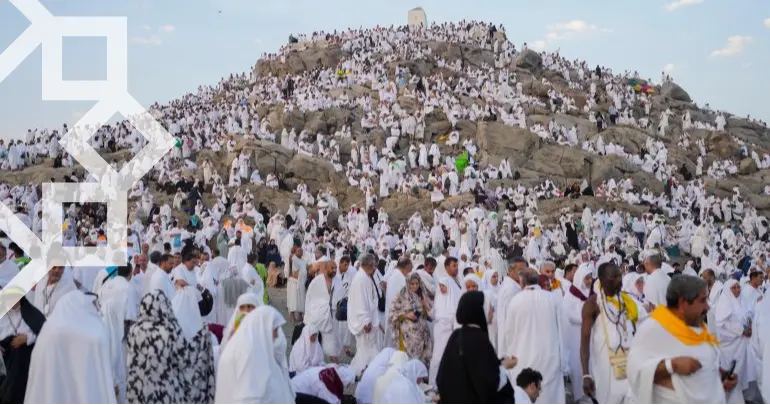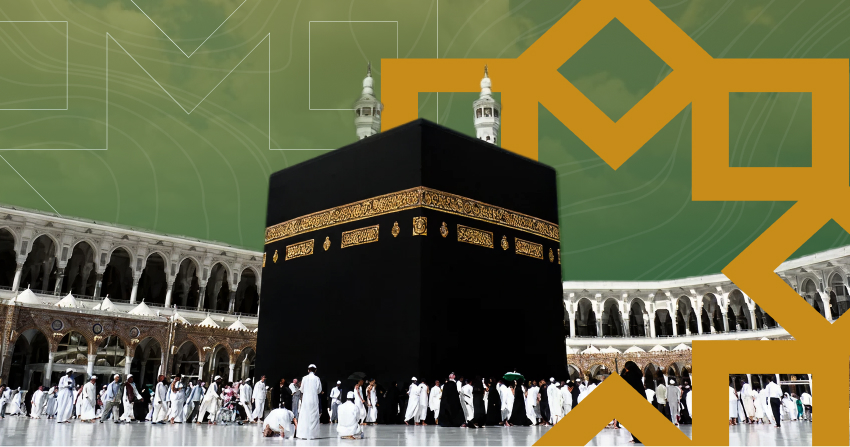Millions of Muslims travel to Makkah each year from around the world, following footsteps that began thousands of years ago. But have you ever stopped to wonder where Hajj began and why it remains such a vital part of our faith?
Imagine a vast gathering of people from all corners of the world, a sea of different faces, colours and languages, all united by one purpose. This is the magic of Hajj, the annual pilgrimage to Makkah, and one of the most profound acts of faith in Islam.
Let’s take a moment to explore the rich history of Hajj and discover why this sacred journey continues to unite hearts across the globe. Understanding its origins helps us appreciate the deep spiritual connection and timeless significance that inspire countless believers each year to take part in this incredible journey.
Donate your zakat
Fulfil your obligation today – give Zakat and be a source of hope for those in need!
The Historical Roots of Hajj
The story of Hajj begins thousands of years ago with Prophet Ibrahim (AS), a figure deeply honoured in Islam for his unshakable faith. Following a divine command from Allah, Ibrahim (AS) took his wife Hajar (RA) and their infant son Ismail (AS) to the barren desert of Makkah, a place with no water, shelter, or people.
As their supplies ran out, Hajar (RA) found herself in a desperate situation. With her baby crying in thirst, she ran back and forth between the hills of Safa and Marwah, desperately searching for help. Her strength and faith were rewarded when Allah caused water to spring from the earth. This became the blessed Zamzam well, a miraculous source of life in the desert, which still flows to this day.
Later, Ibrahim (AS) and his son Ismail (AS) built the Kaaba, the sacred House of Allah. This sacred structure would become the heart of Makkah and the direction Muslims face in prayer. The rituals of Hajj, observed by millions each year, are rooted in the legacy of this remarkable family.
Their story is not just history. It is a timeless reminder of sacrifice, trust, and devotion to Allah.
The Spiritual Meaning Behind Hajj
Hajj is more than just a physical journey. It is a deeply spiritual experience. Each year, Muslims from every corner of the world travel to perform the Hajj as it is one of the Five Pillars of Islam. These are the core principles that shape a Muslim’s faith and daily life.
The pilgrimage offers powerful lessons that stay with a believer for life:
- Equality and Unity: Everyone dresses in a simple white garment called the Ihram regardless of race, nationality, wealth, or social status. It is a reminder that we are all equal in the eyes of Allah.
- Submission and Humility: Hajj encourages spiritual focus and purity. Pilgrims leave behind their usual routines and comforts. The focus shifts completely to worship, self-reflection and asking for forgiveness.
- Sacrifice and Renewal: For many, Hajj feels like a fresh start. It’s a chance to let go of past mistakes, renew your faith and return home with a cleansed heart. It’s often described as a rebirth for the soul.

The Prophet’s Farewell Pilgrimage
During the lifetime of Prophet Muhammad (peace be upon him), the Kaaba had sadly become a place of idol worship.
After many years of calling people back to the worship of one God, he restored the pilgrimage of Hajj to its true and sacred form.
In the 10th year after Hijrah, the Prophet (peace be upon him) performed his first and only Hajj, now known as the Farewell Pilgrimage.
It was during this blessed occasion that he delivered his final sermon, a timeless message of unity, justice and equality that continues to inspire hearts around the world.
He said,
“All mankind is from Adam and Eve, an Arab has no superiority over a non-Arab nor a non-Arab has any superiority over an Arab; also a white has no superiority over a black, nor a black has any superiority over a white- except by piety and good action”
He reminded us that all humans are equal, regardless of race or status, and that we are one Ummah bound by faith and compassion.
His words continue to inspire millions and guide us towards compassion and brotherhood.
What Happens During Hajj?
The rituals of Hajj might seem a bit complex at first, but each one carries deep meaning behind it. Here’s a quick guide to help you understand:
- Ihram: Pilgrims wear simple white clothes to show purity and that everyone is equal in the eyes of God.
- Tawaf: Walking seven times around the Kaaba, which represents the central focus of the Muslim faith.
- Sa’i: Moving quickly between the hills of Safa and Marwah to remember how Hajar desperately searched for water for her son.
- Standing at Arafat: This is the most powerful moment of Hajj. Pilgrims gather to pray and ask for mercy. It’s often described as standing before God on the Day of Judgement.
- Stoning the Jamarat: Throwing small stones at three pillars to show rejection of evil and temptation.
Eid al-Adha: The celebration marks the end of Hajj. It honours Prophet Ibrahim’s willingness to sacrifice his son in obedience to God. In remembrance, a ritual offering is performed as a symbol of faith and devotion.
Bringing hope through small acts of kindness—a meal, a helping hand, or a gift can light up a child’s day.
Why Hajj Matters: Spiritual Renewal for Today
In today’s busy world, where it is easy to feel disconnected, Hajj reminds us of what truly matters: faith, humility, and unity. It’s more than a journey; it’s a deeply personal and spiritual experience that helps us pause, reflect, and reconnect with Allah.
Many save up for years to take this sacred pilgrimage, not for comfort or luxury, but to stand shoulder to shoulder with fellow Muslims, united in worship and purpose. Hajj is one of the pillars of Islam, a clear command from Allah, and a chance to completely cleanse your souls.
As mentioned in the Quran,
“Pilgrimage to this House is an obligation by Allah upon whoever is able among the people.” – Surah Aal-e-Imran (3:97)
When pilgrims wear the simple white Ihram clothing, it’s a powerful reminder that we are all equal, no matter our background, wealth, or status. This humility cleanses the heart and strengthens our faith.
Hajj teaches compassion, unity, and surrender; lessons that are needed now more than ever. It renews our sense of purpose and brings the Muslim family around the world closer together.
A Journey of Unity
Hajj beautifully reflects the unity of the Muslim Ummah. No matter if you are from London, Lagos, Lahore or Jakarta, every pilgrim stands side by side, equal in faith and purpose.
It is a journey that reminds us we are all equal before Allah, no matter our status, race or background.
In a time when the world often feels divided, Hajj brings a special feeling of unity.
Embracing the Spirit of Hajj
Hajj is more than a ritual. It is a powerful journey of faith, sacrifice, and unity that connects us to our history, our Prophets, and one another.
Whether you are preparing to go or simply holding the dream in your heart, know that Allah sees your intention. The path may seem distant, but every sincere longing brings you closer.
Walking in the footsteps of Ibrahim (AS), Hajar (RA), and the Prophet Muhammad (peace be upon him), we are reminded of the beauty of submission, the strength in community, and the hope that grows when we turn to Allah.
